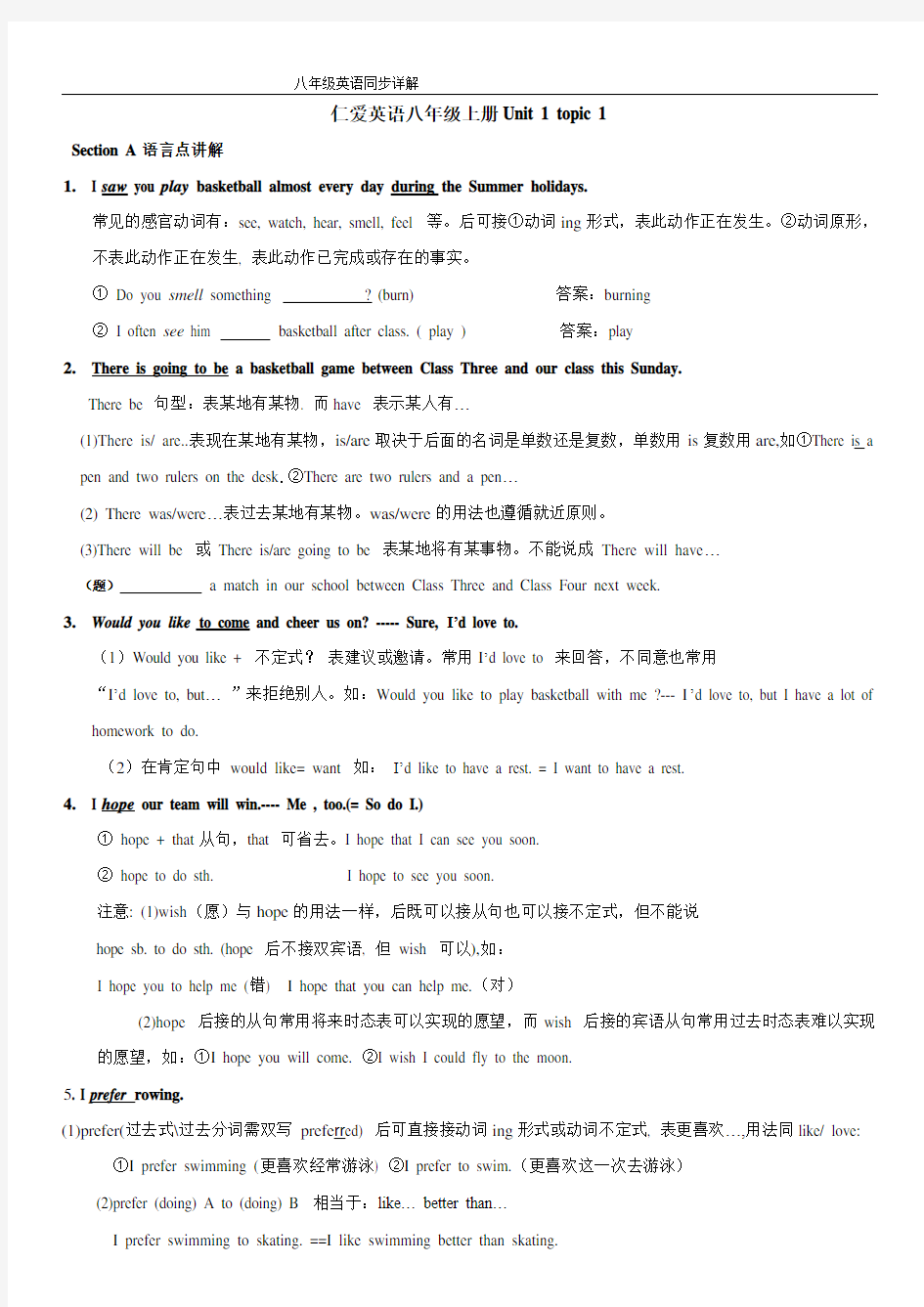
(完整版)仁爱版英语八年级上册教材同步详细讲解
- 格式:doc
- 大小:183.01 KB
- 文档页数:25


仁爱英语八年级上册Unit 1 topic 1
Section A语言点讲解
1.I saw you play basketball almost every day during the Summer holidays.
常见的感官动词有:see, watch, hear, smell, feel 等。后可接①动词ing形式,表此动作正在发生。②动词原形,不表此动作正在发生, 表此动作已完成或存在的事实。
①Do you smell something ? (burn) 答案:burning
②I often see him basketball after class. ( play ) 答案:play
2.There is going to be a basketball game between Class Three and our class this Sunday.
There be 句型:表某地有某物. 而have 表示某人有…
(1)There is/ are..表现在某地有某物,is/are取决于后面的名词是单数还是复数,单数用is复数用are,如①There is a
pen and two rulers on the desk.②There are two rulers and a pen…
(2) There was/were…表过去某地有某物。was/were的用法也遵循就近原则。
(3)There will be 或There is/are going to be 表某地将有某事物。不能说成There will have…
(题) a match in our school between Class Three and Class Four next week.
3.Would you like to come and cheer us on? ----- Sure, I’d love to.
(1)Would you like + 不定式?表建议或邀请。常用I’d love to 来回答,不同意也常用
“I’d love to, but…”来拒绝别人。如:Would you like to play basketball with me ?--- I’d love to, but I have a lot of homework to do.
(2)在肯定句中would like= want 如:I’d like to have a rest. = I want to have a rest.
4.I hope our team will win.---- Me , too.(= So do I.)
①hope + that从句,that 可省去。I hope that I can see you soon.
②hope to do sth. I hope to see you soon.
注意: (1)wish(愿)与hope的用法一样,后既可以接从句也可以接不定式,但不能说
hope sb. to do sth. (hope 后不接双宾语, 但wish 可以),如:
I hope you to help me (错) I hope that you can help me.(对)
(2)hope 后接的从句常用将来时态表可以实现的愿望,而wish 后接的宾语从句常用过去时态表难以实现
的愿望,如:①I hope you will come.②I wish I could fly to the moon.
5. I prefer rowing.
(1)prefer(过去式\过去分词需双写prefe rr ed) 后可直接接动词ing形式或动词不定式, 表更喜欢…,用法同like/ love:
①I prefer swimming (更喜欢经常游泳) ②I prefer to swim.(更喜欢这一次去游泳)
(2)prefer (doing) A to (doing) B 相当于:like… better than…
I prefer swimming to skating. ==I like swimming better than skating.
(3) 后接不定式时与rather than 或instead of连用,如:He preferred to die rather than (to) steal. / He preferred to die
instead of stealing. 他宁死也不去偷窃。
6. -----Do you row much ?你经常划船吗?----- Yes , quite a bit / a lot. 是的,经常。
quite a bit/ a lot 经常/许多,大量.①quite a bit of 后接不可数名词,如:quite a bit of money。②quite a lot of 后既可接可数名词复数也可以接不可数名词,如:quite a lot of books/ information。而③quite a few=many 表“相当多”后接可数名词复数,如:quite a few students④quite a little =much表许多,后接不可数名词,如; quite a little money ⑤very few / little 很少很少。
7.Are you going to join the school rowing club?
①join 加入(人群,组织)②take part in 参加(活动,比赛)
注意:(1)join可与in连用,后接活动,即take part in=join in = be in后都接活动。如:①He joined in the game ;②He joined in helping the old man.③I’ll be in the relay race. (2) Join sb. in doing sth. 表加入某人的活动。如:Will you join us in playing basketball ?
Section B
1.How tall is he, do you know?----- Yes. He is
2.26 meters tall.
与how构成的疑问词有:How tall(身高)多高; how high(山)多高;how heavy多重;how long 多长;How wide 多宽;how deep 多深;how old 多大…. 对应的回答常用“数词+量词+形容词”,如:1.70 meters tall; 2 kilometers high;3 kilos heavy; 20 years old
2.They both play for the Houston Rockets in the NBA.
play for 为某个队效力;play against 与某个队比赛;play with 玩某物/与某人玩(比较:play basketball 打篮球;
Look, the baby is playing with a basketball 玩弄一个篮球)
3. what are you going to be when you grow up ?= what do you want to be …?你长大想干什么?
5.David Beckham, a famous soccer star, arrived in Beijing with his team yesterday.
表到达的有:①arrive at + (小地名);arrive in +(大地名)②get to③reach
6.The fans are very excited.
(1)excited 表“感到激动的、兴奋的”,常只作表语,主语常为人。如:We are excited.
类似的有:interested有趣的; tired感到疲劳的; bored感到厌烦的
(2)exciting 表“令人激动兴奋的”既可作定语,也可作表语;作表语时,主语常为事物,如:①an interesting book;②The book is interesting.
类似的有:interesting令人有趣的; tiring令人感到疲劳的; boring令人感到厌烦的
7.It’s too bad that they aren’t going to stay in Beijing for long.
主语是斜体that从句部分,前用it 来代替它。因此这是一个含主语从句的复合句。
It’s too bad that…= It’s a pity that…= It’s a shame that..很遗憾…..